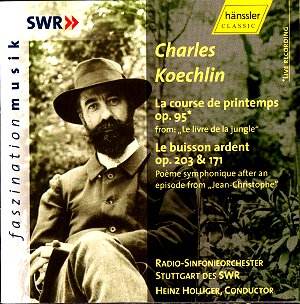|
It has been some time since I last saw Heinz Holliger's
name as a conductor. Holliger, Swiss-born, established himself on the
world stage in the late 1960s and 1970s as the world's leading oboist
- at the very least in the field of contemporary classical. He has since
then spent much time in composition. The world premiere of his opera Snow
White was given in Zurich in 1998. Here he leads the American-established
radio orchestra for Stuttgart in two works by the French composer, Charles
Koechlin.
La course de Printemps is the last in the cycle
of seven symphonic poems making up Koechlin's Jungle Book. They
are based on Kipling. This is a very grown up view of the books with the
wildness and the loss of innocence emphasised. La Course sounds
avant-garde and it is ... and was. The style moves between shadowy Debussian
impressionism, exhausted satiation and rambunctious energy of the sort
heard in Varèse, Cowell and Ornstein. The orchestra handle absolutely
magnificently the long 'abschied' which is like a leave-taking and a forgetting
- all in one (tr. 1 29.11). However the playing seems rough and ready
(tr.1 5.45), if spirited, in the early part of the work. For this reason
you may prefer either the Bedford (Actes-Sud), Segerstam (Marco Polo)
or Zinman (BMG) versions of the complete Jungle Book. The Zinman
is difficult to resist (excellent sound and generously also including
the Seven Stars symphony - 2CDs in a single width box) but Bedford, of
all four versions, is the most vivid even if he does struggle against
analogue sound.
Koechlin and Rolland, each a confirmed pacifist, were
close friends. The Rolland novel 'Jean-Christophe' was world famous. Le
Buisson ardent (The Burning Bush) refers not to the
Biblical burning bush but to the flaming power of rebirth, of flowering
and of death. In its way it echoes the ungovernable power of the Russian
spring (as in Le Sacre) but with an expectation and an ecstatic
drive that places it with Frank Bridge's masterpiece Enter Spring
and the gleaming lunar textures of Schoenberg's Pelleas and Melisande.
It is a much more 'finished' work than La course and despite its
difficulties receives a highly polished performance. The second part dreams
with brilliance and is not at all difficult to appreciate. The shining
radiance of much of this music (tr.3) will win many new friends - friends
who are already captivated by Gorecki's Third Symphony and by the long
threnody of the second part of Allan Pettersson's Seventh Symphony.
Comparing Holliger with Segerstam (on a long deleted
Cybélia disc and then on Naxos Patrimoine 8.550637) the timing
is about the same 38.10 (Segerstam) as against 38.38 (Holliger). Segerstam
benefits from an even better drilled orchestra so if forced to a choice
I would opt for Segerstam. However if this coupling appeals you are unlikely
to feel cheated. The ondes martenot in the second part (written first!)
and its erotic dreamlike setting prompt thoughts about Turangalila.
I wonder whether Messiaen knew the Koechlin piece.
There is one other specialist comparison. The conductor
Roger Désormière (1898-1963) conducted the premiere with
the ORTF orchestra in Le Buisson in 1951. Désormière
has claims to significance in matters Koechlin. On 21 November 1932 he
directed the first ever Koechlin Festival in Paris. The Symphonies
des Hymnes (one of Koechlin's rumoured masterworks - quite unknown)
was conducted by him on 14 June 1938. After the war with the Orchestre
National de la Radiodiffusion he performed The Jungle Book (15
April 1948) and Ballade for piano and orchestra (20 February 1950
with Henriette Faure).
The Désormière disc on Classical Collector
will probably be difficult to find and it is in the historic category.
It is mono for a start. It is closely recorded though with plenty of hall-depth.
Every shuffle, shoe and chair creak is captured. I mentioned Turangalila
earlier on. It is interesting to note that Désormière
conducted the European premiere of that work in Aix in July 1950 - just
over a year before this first performance of the Koechlin piece. I will
not push the parallel too hard but the dream-state summoned by Koechlin
in Part II does have resonances with the Messiaen. Koechlin's textures
are however less saturated and also less exultant; spiritual without being
sensuous. Désormière shaves four minutes off the time taken
by Bedford and Segerstam. Did Désormière's tempi have Koechlin's
approval?
Many Koechlin works remain to be recorded. I hope that
someone will tackle some of these. Conductors would do well to sift through
these ambitious orchestral works: Vers La Voute Etoilée (Towards
the starry skies) (1933), Docteur Fabricius and The Symphony
of Hymns (1938). If only Holliger and the Stuttgart radio orchestra
could be persuaded to record these works.
Rob Barnett
Le Buisson ardent - the competition
Orchestre Philharmonique de Rhénanie-Palatinat/Leif Segerstam -
Naxos Patrimoine 8.550637 also Cybelia CY 812 (the latter with the Cello
Sonata)
Orchestre National de la Radiodiffusion Française/Roger Désormière.
The Classical Collector 150142
|
CD Price: £ 12.99 Post-free Air Mail World-wide
- Download Price:
£ 10.12
Buy
CD:
Download all tracks:
FREE SOUND SAMPLES
(minimum 30 secs)
La
course de printemps Op.95
Le
buisson ardent, Op.203
Le
buisson ardent, Op.171
You require QuickTime to listed to samples.
Get a free
QuickTime download here
|

